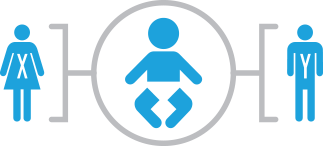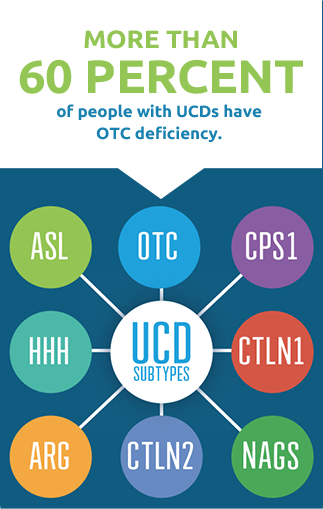![]()
We all inherit traits from our parents through DNA, such as hair colour or eye colour. Our DNA carries all the information about how we will look and how our bodies will grow and work. All that information is carried in parts of our DNA called genes. We have 2 copies of every gene: 1 from our mother and 1 from our father. When we inherit a gene that doesn’t work right, it can cause health problems, such as a urea cycle disorder (UCD).

UCDs can be passed down when 1 or both parents pass on copy of a gene that doesn’t work right to their child. The most common type of UCD is called ornithine transcarbamylase deficiency, or OTC deficiency. OTC deficiency is an X-linked condition. This means it is usually passed on from a mother to her child on her X chromosome. In rare cases, OTC deficiency can also be passed down from a father to his daughter.
![]()
A carrier is a person who has 1 normal copy of a gene and 1 copy that does not work right. Genetic testing can discover whether a person is or isn’t a carrier and can determine the chances of passing on a UCD gene.
1
X-linked
With OTC deficiency, 1 parent (typically the mother) passes on the gene that doesn't work right via the X chromosome
- Men who inherit the gene that doesn’t work right will very likely have symptoms. Women who inherit the gene may or may not have symptoms. They are often called "carriers" and can pass the gene to their children
2
Autosomal recessive
Both parents pass on a copy of the gene that doesn't work right via any chromosome other than the X or Y chromosomes
- People who inherit 2 copies of the gene that causes an autosomal recessive urea cycle disorder will have UCD symptoms
3
Random mutation
Also called "de novo," a mutation that happened for the first time when the cells were forming, a random mutation creates a gene that doesn't work right and causes a UCD
Urea Cycle Disorder Subtypes
Different genes cause different types of UCDs. There are 8 different types of UCDs, often called "subtypes":
- Ornithine transcarbamylase deficiency (OTC) — the most common UCD
- Carbamylphosphate synthetase 1 (CPS1) deficiency
- Citrullinemia I (CTLN1)
- Argininosuccinic lyase (ASL)
- Arginase deficiency (hyperargininemia, ARG)
- Hyperornithinemia-hyperammonemia-homocitrullinuria (HHH) syndrome
- Citrullinemia II (CTLN2)
- N-acetylglutamate synthase (NAGS) deficiency
The name of the subtype tells you which enzyme or transporter in the urea cycle doesn’t work. For example, if you have ornithine transcarbamylase deficiency, it means your ornithine transcarbamylase enzyme is missing or not working.

